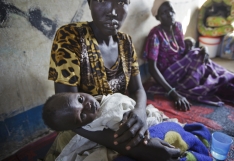Afropessimism – the word may be new to you, but the concept won't be. It's the perfect description of that view we've probably all encountered: that Africa is a 'basket case', a seething pit of hunger, corruption, starvation and bottomless need. A view that sees no shades of grey or colour, that thinks of Africa as a single, hopeless country.
Krish Kandiah's interview with Michael Badriaki critiqued it beautifully, along with providing some prophetic guidance for western aid that doesn't make things worse.
One of the issues he raised was that of perception – of how well-meaning mission and/or development agencies can, in the course of communicating about work in Africa, either inadvertently or cynically perpetuate stereotypes that are damaging to Africans. And it's this I'd like to respond to.
Anyone who spends time with development professionals or who pays attention to the communications styles of medium-to-large international charities will have come across the idea that posting pictures of African children starving with flies in their eyes is not the way things should be done. Badriaki made the very valid point that if that's what you're telling people all of Africa looks like, their view of Africa will be hopelessly and dangerously distorted.
But is anyone really being told that by any credible source? And is that really something that mission agencies and aid organisations can control?
After all, aid and mission agencies are trying, through their communications with supporters and potential supporters, to raise money and prayer and volunteers to fix problems. In order to do that, they have to highlight, to a public that is either indifferent or compassion-fatigued, that there is indeed a problem.
Obviously, if the narrative or images an organisation is pushing are inaccurate or manufactured, that is deeply unethical. But if there really are starving people, if the conflict really is raging out of control, if poverty or infant mortality are a significant problem in the community in which that charity works, is it really that bad to tell the world that? After all, it is the truth.
Of course, it isn't the whole truth. Africa is not a country, it's around 50 countries, and in almost every one, the development tourist cliché, "It's a land of contrasts" is true. People who agree with Badriaki (and I count my development and mission worker friends among them) would be quick to point out that grinding poverty is not the only story in any one country, never mind on the entire continent. But if I were to tell a story that portrayed Africa in terms of my own background as part of the upper middle class in South Africa, many of them, I'm sure, would tell me that that is not "the real Africa". I've heard those exact words many times. And in a sense they are right.
A continent cannot be reduced to a single experience of it, and anyone with half a brain should know that. Moreover, anyone trying to suggest otherwise is doing the world a disservice. But does telling the story or publishing the images of a specific context in which misery and suffering are the truth make a charity guilty of that? I don't think so.
Charities are doing very specific work in the majority of their communications. Yes, a secondary point may be to educate supporters or the public. But when the primary aim is to raise funds or action or awareness, then that is what effective communication must do. The reason a charity providing safe drinking water to a village doesn't tell the story of the village down the road that provided its own water is because that's not its job. They need to tell their story, so that people will support that work.
Does the story of Africans taking charge and solving their own problems deserve to be told? Of course it does. Is that the responsibility of people who have their hands full trying to raise enough support to help those in dire need? No. Blame the media. Blame journalists. Blame the public for its prejudice and appetite for simplistic narratives. Don't blame the people who are trying to help.
I am sure areas of abuse exist. Badriaki no doubt knows more about the subject than I do. But suggesting that all charities telling these stories are part of a "benevolent hegemony that seeks to dominate and misrepresent a people's story, so that they can extract the most out of them" is harsh and disrespectful to the many people working in charities who understand exactly the point he is making but are relating to a public that neither knows nor cares about the subtleties and nuances of aid. A public that has to be convinced that its own financial worries are not as big as the probems faced by others; a public unconvinced that anyone on the other side of the planet is truly, as Jesus might have put it, their neighbour.
It's also unhelpful, because of who will believe it. People who are yet to be convinced of the importance of helping those in need will hear this kind of talk and, justifiably, think they're damned if they do, damned if they don't. They will not be won over to the cause of helping to make the world a better place. They will be annoyed and they will have ammunition in the form of "Africa can take care of itself without my help".
Worse, though, lefties, the socially conscious and those who care passionately about international development, and particularly the progressive Christians among those communities, will lap this up – I know, because I'm one of them. We love an epiphany that tells us how wrong we are, that affirms our sense of guilt and inadequacy just enough to make us smarter, more compassionate, in greater solidarity with the poor than we used to be – and more than our friends.
The problem is that we will take this message further. We will influence aid and mission agencies to act as if there are no problems in Africa, or Asia, or the Americas, or Europe that might require money, a more just international trade and debt system or foreign expertise in places where national governments don't have the will or resources to reach – because, hey, everything's already so amazing there.
It isn't. Much of that is the fault of western countries whose opulence is built on a colonial history that is directly responsible for much of the suffering, poverty and conflict in the developing world. We have a responsibility to help – and Badriaki is right, we must do it responsibly, as partners, not neo-colonial masters or condescending benefactors. But we must equally not let people in wealthy countries off the hook in facing the poverty and deprivation beyond their front doors.
The problem in the UK, the US and other wealthy societies is not, I promise you, that they think Africa is helpless – though I grant that that is a problem, aided by narratives that blame Africa for its poverty. The problem in wealthy countries is that not enough people care enough to do enough to help. Help is needed, whether in the form of fighting injustice or serving those who need some basic assistance right now, even while we build sustainable systems where people can help themselves in the future. But the enemy of all that is not pity, it's indifference and selfishness.
God forbid that, with the best motives in the world, we aid indifference while trying to fight condescension and pity.
During the last decade, Jonathan Langley has interviewed missionaries, development professionals, leaders of the World Church and 'beneficiaries' of aid, both in the developing world and in the UK. He works for a mission agency and grew up in South Africa.
















